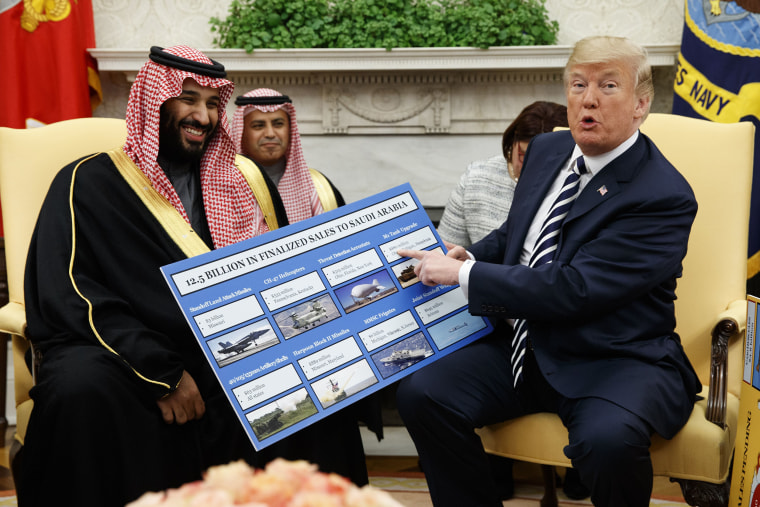WASHINGTON — Senators from both sides of the aisle said Wednesday they planned to block U.S. arms sales to Saudi Arabia and other Arab states in a bipartisan rebuke of President Donald Trump, saying they had to act to safeguard Congress's right to review weapons deals.
The announcement from the bipartisan group of senators was the first response from Congress after the Trump administration bypassed lawmakers on May 24 to push through more than $8 billion worth of arms deals to Saudi Arabia, the United Arab Emirates and Jordan.
Congress by law reviews all arms sales. But Secretary of State Mike Pompeo declared a national security "emergency" to push through the package without congressional approval, citing what he called an urgent threat posed by Iran.
The senators are introducing 22 separate joint resolutions of disapproval for each of the sales, setting up a possible confrontation with Trump that could play out in coming months. If the resolutions are adopted and Trump vetoes the measures, Congress would have to secure a two-thirds majority to override a presidential veto.
It’s unclear if the legislation could secure the two-thirds majority needed to overcome a presidential veto. But there is growing concern across the political spectrum over the administration’s approach to Saudi Arabia and its treatment of Congress.
In a vote in March to end U.S. military support for the Saudi-led war in Yemen and check presidential war powers, seven Republican senators joined Democrats to pass the bill. Trump vetoed the legislation last month.
The legislative action was necessary "to protect and reaffirm Congress' role of approving arms sales to foreign governments," said a statement from Republican Sens. Lindsey Graham, Todd Young, Rand Paul and Democratic Sens. Bob Menendez, Patrick Leahy, Chris Murphy and Jack Reed.
"The manner in which the administration has moved forward with these sales is unprecedented and is at odds with longstanding practice and cooperation between the Congress and the executive branch that results in the approval of billions of dollars of arms sales annually," the senators' statement said.
The dispute over the arms sales is the latest sign of friction over a range of issues between Trump and his fellow Republicans in Congress, many of whom are frustrated at the administration's handling of nominations and its attempts to avoid congressional oversight. Republican lawmakers warned the White House this week not to go ahead with threatened tariffs against Mexico.
The new arms sales faced opposition in Congress partly because of the administration's decision to bypass lawmakers but also because of growing outrage over the Saudi-led coalition's war in Yemen and the killing of Washington Post columnist Jamal Khashoggi at the Saudi consulate in Istanbul.
Arguing against the arms sales, Graham, R-S.C., an ally of Trump on most issues, referred to Saudi Crown Prince Mohammed bin Salman's alleged involvement in Khashoggi's killing. The CIA has concluded that the crown prince approved of the killing of Khashoggi, a Saudi national who resided in Virginia.
"While I understand that Saudi Arabia is a strategic ally, the behavior of Mohammed bin Salman cannot be ignored. Now is not the time to do business as usual with Saudi Arabia," said Graham, who leads a subcommittee that oversees funding for the State Department.
"Regrettably, Secretary Pompeo's abuse of this emergency authority has broken the arms sales process," said Menendez, the ranking Democrat on the Senate Foreign Relations Committee.
If the secretary of state fails to withdraw his emergency declaration and submit the arms sales for congressional review, said Menendez, "I am prepared to move forward with any and all options to nullify the licenses at issue for both Saudi Arabia and UAE and eliminate any ability for the Administration to bypass Congress in future arms sales."
The planned arms sales include mortar bombs, engines and maintenance support for F-15 fighter jets for Saudi Arabia and equipment for AH-64 helicopters, laser-guided rockets, javelin anti-tank missiles, Patriot missiles and F-16 fighter jet engine parts for the United Arab Emirates.
But the most controversial weapons in the deal are precision-guided bombs, which would almost certainly be used in the Saudi-led air war in Yemen.
The United States has supplied tens of thousands of the bombs to Saudi Arabia and others in the coalition, said William Hartung, director of the Arms and Security Project at the Washington-based Center for International Policy.
The emergency package unveiled by Pompeo last month will include "a large tranche of bombs, probably thousands" of them, worth hundreds of millions of dollars, he said.
Obama suspended the sale of the bombs in the closing months of his administration over concerns that the Saudis were failing to take precautions to avoid killing civilians. "It was a signal to the Saudis after intelligence had shown they were not reducing civilian casualties," Hartung said.
Human rights advocates, aid groups and U.N. investigators have accused Riyadh of conducting indiscriminate bombing but the kingdom insists it seeks to minimize killing civilians.
"Selling more bombs to the Saudis simply means that the famine and cholera outbreak in Yemen will get worse, Iran will get stronger, and Al Qaeda and ISIS will continue to flourish amidst the chaos of the civil war, " said Murphy, D-Conn.
In the House, where Democrats hold a majority, lawmakers are considering introducing legislation that would require the administration to resubmit the arms sales for congressional approval, two Democratic congressional aides told NBC News.

